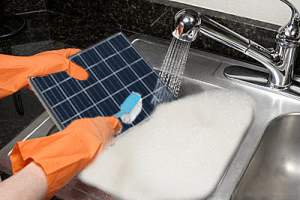Florida’s USSolar Institute (USSI) exposes solar panel maker Blue Chip Energy as a fraud in the photovoltaic (PV) industry, sparking a nationwide panel recall from Underwriters Laboratories (UL) listing, violations citations, and more.
Fort Lauderdale, FL – April 22, 2013 – The year 2012 was a banner year for America’s solar industry, with a record-breaking 3.9 gigawatts (GW) of new PV capacity brought online. But with this phenomenal growth comes a host of new challenges as manufacturers across the globe vie for their slice of solar panel pie. ASP (aka Blue Chip Energy) is sadly the latest PV solar panel producer accused of defrauding customers with misleading claims about panel performance.
QUOTE: “ASP claimed to have sold me 245-watt panels, but when installed, they only generated 165 watts.”
ASP’s founder Dmitri Nitikin’s fraudulent activity dates back many years and should come as no surprise to those who have witnessed the many unethical activities lead by him. Over the past 13 years, over 25 different articles highlighting fraud, lawsuits and charges for funneling investor dollars into luxury homes and affluent lifestyle choices have been published in business journals, in Florida alone.
In December of 2000 Nitikin was forcibly removed from the very company he founded – Precision Technology Group for his unethical conduct.
Yet only a few years later, again in Florida, Nitikin was praised for activities that are now understood to also be fraudulent. Signs were most likely there for those close to Bernard Madoff and Scott Rothstein, too. Those cheated by Nitikin in Florida (and beyond) can only hope Nitikin will one day be prosecuted and locked away as those other master deceivers were.
In 2009 US Solar Institute a Fort Lauderdale-based PV training college ordered ASP’s True Blue panels for its training program. But when the products arrived, it was discovered that they had been made by a defunct third party manufacturer. ASP company spokesman and Director of Business Development Carlos Gonzales stated the panels were simply overstock items offered at low prices because they were part of a lot of antiquated solar panel factory equipment ASP purchased from BP when they closed operations. Fair enough, but still deceptive, and a sign of what was to come.
In 2010 ASP True Blue panels were again ordered and this time installed on the newly acquired campus of the Fort Lauderdale institution. Within minutes it was discovered that the panels failed to deliver their stated performance. ASP refused to answer calls or letters; they refused to discuss the problem, despite having been advised that scientifically collected data highlighted performance problems. USSI proved that ASP panels only produce 65 percent of their listed power, but it took over a year and a UL listing violation to get ASP to respond to the problem.
According to USSolar Institute President and Founder, Ray Johnson, “It was a straightforward complaint with an easy fix. ASP claimed to have sold me 245-watt panels, but when installed, they only generated 165 watts.” Johnson adds, “It was only after involving our corporate attorney that ASP agreed to ‘look into the situation.”
After shipping two panels at the college’s cost, ASP finally acknowledged that its panels did not produce the stated power output; however, ASP refused to refund or buy back the panels. The college offered to “eat the difference at today’s price level” to avoid the cost of removing, shipping and reinstalling. But, after Johnson presented this generous offer Genti Zeqo, a spokesman from yet another of Nitikin’s suspicious companies (ICT Investments), stated that there simply was no money in the company to honor any refund and that ASP could only offer replacement panels from a third party panel manufacturer.
So, at direct cost to installer Florida Solar One, the panels were removed and delivered to ASP. Replacement panels were received from a skeleton crew at ASP’s dark, inactive factory in Lake Mary, FL. Blue Chip Energy’s VP of Operations Wayne Tupola said, “You should feel lucky that we are willing to provide replacement panels.”
Tupola may be correct, because others may soon discover the fraud and will not be so lucky. The biggest customer that comes to mind is the Marines at Camp Lejeune. Marines do not go “quietly into the night” and since Camp Lejeune houses a well known military prison, one shudders to think what would come to Nitikin when the Marine’s realize they were bamboozled to the tune of five megawatts for fake ASP panels.
Upon entering the property, one notices that signs for neither Blue Chip Energy nor ASP can be found anywhere on the building. Instead the name is now Sfinkx and one wonders if it will be the next Nitikin founded company to commit fraud.
Based on comments made by the few remaining workers who still occupy the building, they know their time is short; they were all quick to hand out personal notes with their names and phone numbers, in hopes of getting jobs quickly once the Blue Chip ship has finally sunk. Others have written to share they have been forced to file labor department claims to receive their wages, wages earned months ago.
Although USSolar Institute was the first to bring this fraud to light, both UL and Florida Power and Light (FPL) have now gotten involved. In a comprehensive review of the situation those at UL have discovered that not a single ASP panel produced has ever been properly listed or tested by the global leader in electrical safety and testing. As such, it is almost certain that if you have an ASP panel, its performance label is a fraud.
After an in-depth investigation, UL determined that ASP had consistently and knowingly defrauded customers with false marketing claims and faulty technology – actions that have resulted in the closing of ASP’s factory and a global recall of panels sold across the U.S., the Caribbean, and South America.
“The Sunshine State should represent the best of what the solar industry has to offer,” comments Johnson. “Dishonest manufacturers are holding us back as states like New Jersey and Maryland surge ahead, despite having fewer solar resources.”
Frustrated by the experience but determined to bring greater transparency to the market, USSolar Institute is conducting a “Real World” PV Challenge“ in which it publicly tests leading panel technologies side-by-side under live conditions and will continue to be Florida’s solar watchdog, to protect those who try to defraud good people in Florida and beyond.
To learn more about the ASP panel scandal and recall, visit: http://ussolarinstitute.com/orlando-based-asp-solar-panel-fraud-fpl-soon-to-notify-home-owners/
To learn more about the Real World PV Challenge, visit: http://ussolarinstitute.com/ussolar-institute-to-conduct-real-world-solar-pv-challenge/
To learn more about USSolar Institute, visit: http://ussolarinstitute.com/
About USSolar Institute
USSolar Institute is a globally diversified solar energy corporation with headquarters in Fort Lauderdale, Florida and offices, dealers, and partners around the world. USSolar remains dedicated to comprehensive solar education and consulting services by providing global construction management, engineering, and financing solutions for virtually any sized project or system need.
Originally Posted on USSolarInstitute

